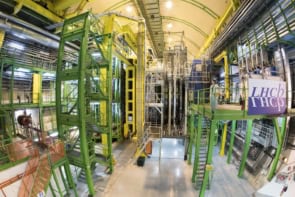In response to a serious shortfall in its budget that came to light last year, CERN looks set to delay the start-up of its Large Hadron Collider (LHC) by twelve months. The measure is part of a new long-term plan published by the lab’s management, which proposes the transfer of SFr500m – about £210m – from other areas of CERN’s budget to pay for the collider. According to the plan, the LHC would not collide its first protons until April 2007.
In September last year CERN shocked its member states – which fund the lab – with the news that the LHC would cost some SFr850m more than originally budgeted. In response the Council of the member states told the management to revise its spending so that CERN could pay for the extra costs without increasing its overall budget.
The saving of SFr500m identified by the management would not lead to a reduction in the number of CERN’s own staff but would involve cuts in support staff provided by industrial contractors, including engineers. It would also mean a drop in the number of student researchers and scientific fellows that the lab could fund in coming years. In addition, the plan would mean limiting the operating time of certain experiments, including shutting down the Super Proton Synchrotron in 2005; scaling back travel and other general overheads; and reducing the amount of R&D on potential new facilities, such as a neutrino factory or an advanced linear collider.
Some savings would also be made by postponing the start-up of the LHC, although a spokesman for the lab said that the collider would have been delayed anyway because of a shortage of superconducting cable needed for the collider’s magnets.
All of these measures, however, would still leave the lab facing a shortfall of SFr350m. This could be paid for by holding back final payment for the LHC until 2010 or by increasing CERN’s overall budget. The latter would allow financing of the machine to be complete by 2009 and would enable limited R&D to continue but would not be popular among member states. Switzerland, however, has agreed to advance CERN SFr90m to pay for the LHC, money that will be deducted from Swiss contributions in later years.
CERN’s Council will decide on the management’s plans at a meeting in June, allowing it to take into account the findings of an external review committee set up in October to identify budget cuts.



